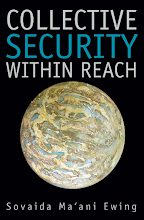That the world is being buffeted by storms of severe crises is not news even to the most casual observer of the international scene. Chief among these are the financial crisis in Europe, which threatens to slow down economic growth worldwide, the environmental crisis as reflected in global warming and climate change, the looming food and water crises and the crisis of international security which encompasses issues of nuclear proliferation, human rights atrocities and acts of terror to name but a few.
What is more interesting and worth examining is the increasingly common reaction to these crises by peoples across the globe as reflected in their drive to separate and take refuge in fragmentation, all in the mistaken belief that independence will afford them more control of their own destinies, and will save them of the dangers of going down with the sinking ship of a larger country or region to which they belong.
Looking at Europe alone, one is struck by the increasingly strident movement towards separatism as witnessed by the desire of the people of Flanders for further autonomy, the movement by the Catalans to gain independence from Spain and the drive by segments of the Scottish population to break away from the United Kingdom as reflected in the Edinburgh Agreement just signed between British Prime Minister David Cameron and Alex Salmond, the Scottish First Minister setting the terms for a Scottish referendum on the subject of independence to be held in 2014.
The arguments that are offered in all three cases center on two main themes. The first theme stems from the resentment of people in these regions who are relatively wealthy compared with the rest of their respective countries and who perceive themselves to be more hard-working, that their wealth and hard work are being exploited to support their poorer and/or lazier compatriots. They resent being required to pay more in the form of taxes, to give up revenues from their natural resources and to carry a large share in the debt of the larger countries to which they belong.
The second theme rests on a strong desire to have decisions on fundamental policy questions be made by the people who are closest to and most affected by the decisions, rather than by distant institutions that are perceived as being out of touch with the needs of a particular group of people and that tend to apply a uniform policy to all without taking important differences into account.
One can see that what seems to lie at the root of these arguments is a genuine and legitimate desire on the part of people everywhere to have a reasonable say in the crafting of their own destinies. This is a theme our times as reflected in the wave of nations participating in what has become known as the Arab Spring. The sensible question to ask then is: in what instances is centralization a boon and when does it become out of touch with the grass roots and therefore oppressive and unfair? The next question is: how can we craft a system of government that allows people to consult upon their legitimate needs while at the same time working towards unification? For we face a real danger that in our rush towards fragmentation as a perceived panacea for solving all difficulties, we will set off a chain reaction of increasing fragmentation into smaller and smaller parts without a well-designed link between the parts. How much fragmentation is enough? How small must the units be for people to feel secure and feel that they have a voice in their own destiny? One can see that if left unchecked, this process can easily degenerate into an avalanche of greater and greater fragmentation and balkanization generated and fed by fear. In a world in which interdependence is a fixed reality, this will only lead to conflict and despair.
Might not the real solution lie in deeper integration both in Europe and indeed in the world? Such integration would signal a further step in the process of maturation of humanity as a whole. Having evolved from a societal system comprising small but increasingly growing loyalties to clan, tribe, city-state and nation, isn't the next natural step in our societal evolution the creation of a federated superstate in which each individual embraces a larger loyalty that is entirely compatible with the lesser loyalty to her nation state? Such a federated state can and should be designed to meet the legitimate needs of individual populations, granting them autonomy over many issues of particular concern to them while also guaranteeing the good of the whole by requiring that the federated parts cede certain rights to decision making to the federal government. These latter rights should sensibly include the right of individual nations to make war on each other, relying on a central army serving the whole to maintain the peace, the right to manage critical natural resources including energy resources for the benefit of all the people of the world, thereby eliminating conflict and inequality of access to sources of energy, and certain rights to taxation in order to raise funds to tackle global problems such as global warming.
If we need a model or blueprint to guide us in undertaking such a vital and bold experiment, it is worth examining the federal system of the United States, which appears to have been relatively successful both in balancing the needs of the whole with the needs of the individual parts and in inculcating the principle of unity in diversity in its workings.
If we need a model or blueprint to guide us in undertaking such a vital and bold experiment, it is worth examining the federal system of the United States, which appears to have been relatively successful both in balancing the needs of the whole with the needs of the individual parts and in inculcating the principle of unity in diversity in its workings.
